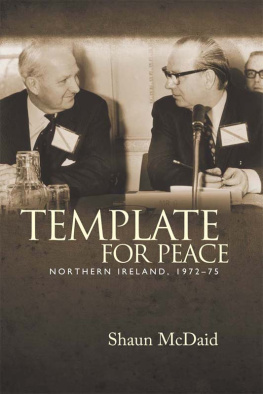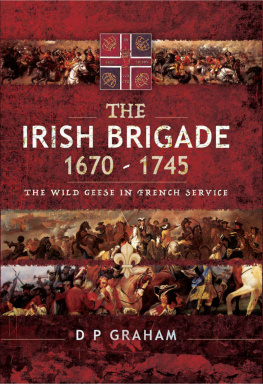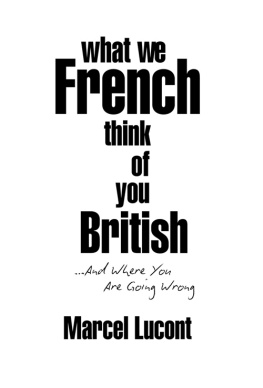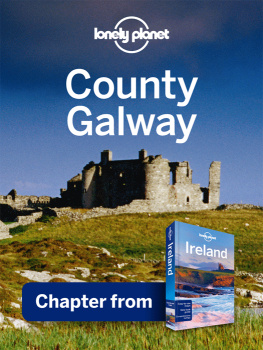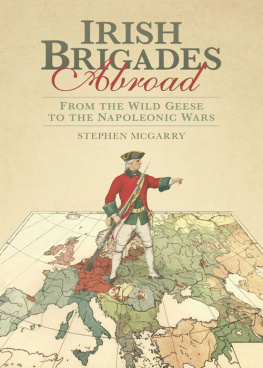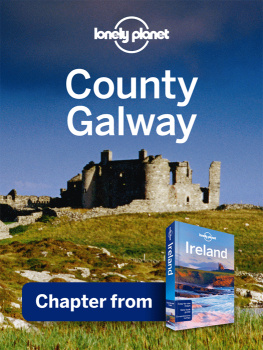
Serving France, Ireland and England
This book assesses the service of Henri de Ruvigny, later earl of Galway, in France until the revocation of the edict of Nantes in 1685, his central role in transforming Ireland in the aftermath of the Glorious Revolution, and his service of the British monarchy as administrator, military commander and diplomat. The analysis rests on underutilized sources in French, shedding light on a hitherto overlooked civil servant in this crucial period of Irish and British history, wrought with constitutional crises, but also on the Protestant International and the lesser-known fronts of the war of 16891697.
Marie M. Loutre has worked at the Manuscripts Department of the National Library of Ireland, as a Researcher for the Irish Governments Mother and Baby Homes Commission of Investigation and is now a Research Assistant for Marshs Library in Dublin.
Politics and Culture in Europe, 16501750
Series Editors
Tony Claydon,Bangor University, UK
Hugh Dunthorne,Swansea University, UK
Charles-douard Levillain,Universit de Lille 2, France
Esther Mijers,University of Reading, UK
David Onnekink,Universiteit Utrecht, The Netherlands
Focusing on the years between the end of the Thirty Years War and the end of the War of the Austrian Succession, this series seeks to broaden scholarly knowledge of this crucial period that witnessed the solidification of Europe into centralized nation states and created a recognizably modern political map. Bridging the gap between the early modern period of the Reformation and the eighteenth century of colonial expansion and industrial revolution, these years provide a fascinating era of study in which nationalism, political dogma, economic advantage, scientific development, cultural and artistic interests and strategic concerns began to compete with religion as the driving force of European relations and national foreign policies.
The period under investigation, the second half of the seventeenth century and the first half of the eighteenth, corresponds with the decline of Spanish power and the rise of French hegemony that was only to be finally broken following the defeat of Napoleon in 1815. This shifting political power base presented opportunities and dangers for many countries, resulting in numerous alliances between formerly hostile nations attempting to consolidate or increase their international influence, or restrain that of a rival. These contests of power were closely bound up with political, cultural and economic issues: particularly the strains of state building, trade competition, religious tension and toleration, accommodating flows of migrants and refugees, the birth pangs of rival absolutist and representative systems of government, radical structures of credit, and new ways in which wider publics interacted with authority.
Despite this being a formative period in the formation of the European landscape, there has been relatively little research on it compared to the earlier Reformation, and the later revolutionary eras. By providing a forum that encourages scholars to engage with the forces that were shaping the continent either in a particular country, or taking a trans-national or comparative approach it is hoped a greater understanding of this pivotal era will be forthcoming.
Serving France, Ireland and England
Ruvigny, Earl of Galway, 16481720
Marie M. Loutre
For more information about this series, please visit: www.routledge.com/Politics-and-Culture-in-Europe-1650-1750/book-series/PCE
Serving France, Ireland and England
Ruvigny, Earl of Galway, 16481720
Marie M. Loutre
First published 2018
by Routledge
2 Park Square, Milton Park, Abingdon, Oxon OX14 4RN
and by Routledge
711 Third Avenue, New York, NY 10017
Routledge is an imprint of the Taylor & Francis Group, an informa business
2018 Marie M. Loutre
The right of Marie M. Loutre to be identified as author of this work has been asserted in accordance with sections 77 and 78 of the Copyright, Designs and Patents Act 1988.
All rights reserved. No part of this book may be reprinted or reproduced or utilised in any form or by any electronic, mechanical, or other means, now known or hereafter invented, including photocopying and recording, or in any information storage or retrieval system, without permission in writing from the publishers.
Trademark notice: Product or corporate names may be trademarks or registered trademarks, and are used only for identification and explanation without intent to infringe.
British Library Cataloguing-in-Publication Data
A catalogue record for this book is available from the British Library
Library of Congress Cataloging-in-Publication Data
A catalog record for this book has been requested
ISBN: 978-1-138-20719-6 (hbk)
ISBN: 978-1-315-46289-9 (ebk)
Typeset in Sabon
by Apex CoVantage, LLC
In loving memory of Frdric Bouclier
0.1Map of Europe, 1700. Wells, Edward, A new sett of maps both of the antient and present geography together with a geographical treatise (Oxford, 1700), Wing W. 1288
0.2Portrait of Ruvigny, earl of Galway, c. 1704. Engraved by John Simon
The research for this book started in 2007 under the direction of Dr Declan Downey at University College Dublin, where I was enrolled for a Masters in Early Modern History. No substantial biography of Ruvigny, earl of Galway, had been undertaken since 1864 and a reappraisal of his political, military and diplomatic career in exile in the light of French sources appeared timely. His European significance was not missed by the Irish Research Council for the Humanities and Social Sciences, who funded my doctorate. I was lucky to be supervised by Dr Charles Ivar McGrath in this endeavour, whose academic guidance, support and good humour have been unfailing over the years.
I am indebted to Janet and the late Brian Curran, Gordon Blackshields and Anna-Andra Ob-Gervais for their hospitality during my numerous research trips to London and Nottingham archives. Susan Kellett provided me with a writing retreat in Mayo in 2011. I am also grateful to, among others, Evelien Schillern, Jim McCrohan and Neil Johnston for the doctoral discussion group which made the PhD such an enriching experience. The staff in all the repositories in Ireland, England and France have always been helpful and made research easier. The constant support of Jonathan OToole during these early years has also been crucial. Thank you.
This book has been in gestation since 2012, and I am grateful to those who encouraged me since then to publish it, especially Dr Liam Chambers. I am particularly indebted to the colleagues and friends throughout the world who have helped make it come to life in the past twelve months. I am grateful to David Van der Linden and David Onnekink for their early support in the project. I wish to thank wholeheartedly Robin Gwynn, Patrick Walsh, James Kelly, Jason McElligott, Raymond Pierre Hylton, Suzanne Forbes, Liam Chambers, Lionel Laborie, and Caroline Woodiel for their critical reading of draft chapters, robust advice and engaging conversations. Jennifer Wells, Emma Lyons, Brid McGrath, Suzanne Forbes, R. P. Hylton, C.I. McGrath, Jean-Paul Pittion, Claire OFlaherty and Coleman Dennehy have provided references, access to remote or rare books and articles, and moral support. Maria OShea, James Harte, Ian McEnzie and David Guyon have graciously provided the illustrations, some of which are in private hands. I owe special thanks to my friend Danielle Godfrey, who read and emendated the whole manuscript with her characteristic patience and thoroughness. Michael Bourne and Max Novick of Routledge have been a pleasure to work with. Charles-douard Levillains guidance and kindness in the final editing process helped make the earl of Galway come to life. Pat Finnerty provided me with a home to complete the final touches of the book. All remaining errors are, of course, solely my own.




